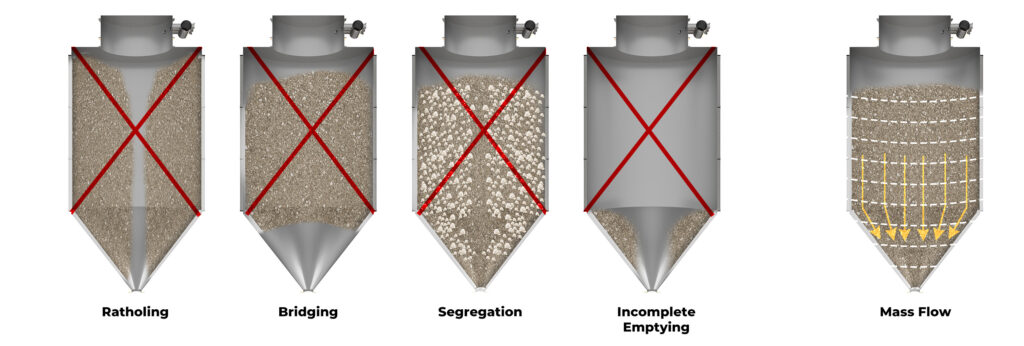When it comes to bulk material handling, poor flow problems are one of the most common issues experienced in industrial systems. Basically, when a bulk solid is put to be stored in a vessel, some of it / or all of the product is stuck inside the vessel. An obvious sign of flow problems is slower discharge of your silo or inconsistent flow of bulk material. If not handled well, flow problems could cause serious outcomes from messing up the production line completely, to an explosion in the plant. In this blog post, flow problems, causes and improving methods are discussed.
Poor/Bad Flow Problems
Flowability of bulk solids is affected by many factors (such as physical properties of product, vessel design, external parameters). So there are numerous flowability problems experienced. The most common poor flow problems are:

Arching / Bridging: Bulk solid build up to an arch-shape obstacle such that material flow stops completely.
Ratholing: Sticky bulk solid sticks on the walls of the vessel (dead zones), causes the capacity to be reduced, and the stuck product could be contaminated.
Segregation: Stored bulk solid particles segregate/smaller in size in uncontrolled fashion.
Poor flow outcomes:
- Reduced capacity of storage unit because of caked or jammed bulk solid inside the vessel
- Inconsistent product flow can cause instant downtime of the bulk solid handling system, hence increases maintenance efforts for the equipment
- Especially for the food and chemical industry – leftover bulk solid inside the vessel may be contaminated and spoiled. Resulting in lower product quality.
- Traditionally, to solve flow problems, operators manually hammer or shake the storing unit – this shortens equipment lifetime and for large capacity units; can cause the silo to be pulled down.
- The most serious outcome is, if the handled bulk material has explosive properties, with an agitation, it could cause an
Causes of Flow Problems
What causes the flowability problems can be generalized in terms of physical properties of bulk solids, vessel design and external conditions.
Bulk solid physical properties affecting flowability:
- Cohesion & adhesion forces: If particles within bulk solid have high cohesion forces, particles tend to stick together, resulting in arching. If adhesion forces are stronger, bulk solid sticks on the walls, hence forming a rathole.
- Particle size & shape: Particles in granular form have less tendency to stick to each other, and if the particle shapes close to a sphere, they do not interact with each other, and flow well.
- Bulk density: As the particle density & bulk density increases, it is easier for the particles to flow because of the gravitational forces.
- Angle of repose: One of the most important parameters is how steep a stockpile is obtained when the product is poured. Then angle of repose is measured, giving clues about flowability of that material.
- Hydrophilicity: If bulk solid tends to absorb moisture, it will get sticky inside the silo.
Silo design:
- Dimensions such as the silo outlet are critical while bulk solid is discharged.
- Shape and angle of the discharge cone is important.
External conditions:
- Especially if the bulk solid tends to absorb moisture from air, locations with high moisture content could cause flowability problems in storage units like silos.
- High or low temperature conditions do affect flowability depending on the bulk solid properties.
Polimak Bin Activators - How do they help?
Silo – bin activator is a vibrating equipment used to “activate” the flow of bulk solids stuck in a storage bin or silo for industrial applications. Dry solid materials that are stored for an extended period of time or having low flowability can cause clogging, making it difficult or impossible to discharge them without breaking them up. The bin activator helps discharge solid products by generating vibrations and sending them through to the material. By using a bin discharger, less flowable materials can have a regular, consistent, quick and safe flow.
Having a great deal of experience with bulk solid handling, Polimak Group provides the most ideal solutions for handling systems to the users. Polimak Bin activators have numerous of benefits:
- Allows you to discharge more quickly, easily, and with less mess. Hence, reduces the time spent on discharging bulk solid products from silos.
- Eliminates the need for manual labor in discharging bulk solid products such as hammering. Also, the bin activator sends vibrations without agitating explosive materials.
- Minimizes wear and tear on discharge points, which can extend the life of your equipment
- Polimak Bin activators come with different models so that users can handle bulk solids in different industrial applications – from food industry to handling abrasive materials.
- Reduces downtime for cleaning and maintenance of silos or hoppers
- Polimak Bin-Silo activators can be modified or provided with other accessories according to user’s application
- Polimak Process Technology also loves to solve a challenge, custom-made bin activators for non-standard sized silos or unusual bulk handling systems can be designed. Please contact us from [email protected]